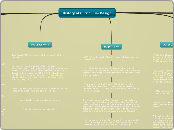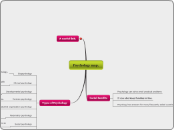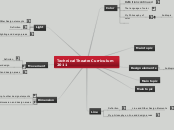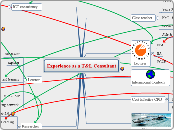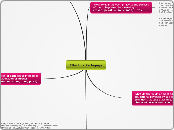History of Curriculum Design
References:
References:
Philosophy of Education. (2013, March 5). Retrieved from Wikipedia: http://en.wikipedia.org/wiki/Educational_philosophies#Plato
Jacobs, H. (2010). Curriculum 21: Essential Education for a Changing World. Alexandria, VA: ASCD.
Neill, J. (2005, January 25). John Dewey: Philosophy of Education. Retrieved from Experiential Learning: http://wilderdom.com/experiential/JohnDeweyPhilosophyEducation.html
Pilder, W. (1969, March). Curriculum Design and Knowledge Situatioin. Retrieved from ASCD: http://www.ascd.org/ASCD/pdf/journals/ed_lead/el_196903_pilder.pdf
Smith, M. (1996, 2000). Curriculum theory and practice. Retrieved from The encyclopedia of informal education: http://www.infed.org/biblio/b-curric.htm
Tyler, R. (1949). Basic Principles of Curriculum and Instruction. Chicago: The University of Chicago Press .
21st Century
Began with Standardization with an emphasis on low-level testing and dated standards. Standards are all different based on individual state standards. Committe of 10 systems and structures for American schools are still in place.
2001 -NCLB: No Child Left Behind legislation - some states lowered standards to ensure evidence of student growth. There is a need for global and real world education.
Common Core: 2011 National English, Language Arts and Math standards. Incorporates higher level thinking, connections to the real-world and 21st century skills. More rigorous at all levels.
2004: Wiggins, (et al) developed the "Understanding by Design" guide to curriculum devlelopment based on esseential questions, standards, enduring understanding, and 21st century skills and real-world connections.
References:
Philosophy of Education. (2013, March 5). Retrieved from Wikipedia: http://en.wikipedia.org/wiki/Educational_philosophies#Plato
Jacobs, H. (2010). Curriculum 21: Essential Education for a Changing World. Alexandria, VA: ASCD.
Neill, J. (2005, January 25). John Dewey: Philosophy of Education. Retrieved from Experiential Learning: http://wilderdom.com/experiential/JohnDeweyPhilosophyEducation.html
Pilder, W. (1969, March). Curriculum Design and Knowledge Situatioin. Retrieved from ASCD: http://www.ascd.org/ASCD/pdf/journals/ed_lead/el_196903_pilder.pdf
Smith, M. (1996, 2000). Curriculum theory and practice. Retrieved from The encyclopedia of informal education: http://www.infed.org/biblio/b-curric.htm
Tyler, R. (1949). Basic Principles of Curriculum and Instruction. Chicago: The University of Chicago Press .
Concept-based curriculum standards are adopted by CDE (Colorado Department of Education). 2007- present.
Next Generation Science Standards - Final draft will be published in April of 2013. Is focused on inquiry, higher level thinking, literacy and technical writing, aligned with ELA and math common core, incorporates engineering practices and the science practices. Curriculum is deeper, not wider and connects learning expereiences to the real world and is student - focused.
2001: Marzano publishes the meta research study on "Classroom Instruction that Works. Also, in 2003 he published "What Works in Schools: Translating Research into Action". Robert Marzano
2006: "Learning by Doing: A Handbook for Professional Learning Communites at Work" by Richard Dufour (et al)
Other 20th Century theorists
1926: Harold Rugg: Published the "Twenty Sixth Yearbook". Focused on the Knower acting in a knowing situation. " The cognitive knowing situation has been better developed than by the affective dimension of knowing". (Pilder, 1969)
1987: Grundy: Defined curriculum as a program of activities design so that pupils will attain the educational objectives. Programs are strictly adhered to and are "teacher proof". Grundy starts from Habermas' theorisation of knowledge and human interest and makes use of Aristotle to develop a models of curriculum around product, process and praxis
1907: Montessori: Experimental education. Constructivist view of education and curriculum.
Essentialism: 1940 - knowledge is the most important thing. More traditional education. Still is prevelent in today's schools.
A Definition of Curriculum(Daniel Tanner, 1980):The planned and guided learning experiences and intended learning outcomes, formulated through the systematic reconstruction of knowledge and experiences, under the auspices of the school, for the learners’ continuous and willful growth in personal social competence.
1975: Lawrence Stenhouse: Process model of curriculum and practice. Communicate the essential principles and features of an educational proposal so that it is open to scrutiny by students and can translate into practice. (Students accessing the curriculum and acting on it).
Ralph Tyler
1949: Wrote the book: "Basic Principles of Curriculum and Instruction".
The book outlined one way of viewing an instructional program as a functioning unit of educatioin. The student was encouraged to partipate in the relationships and conceptions of the curriculum.
Supported the work of Franklin Bobbitt (1928) who published the idea of the curriculum being a series of experiences which children must have by way of obtaining those objectives.
Developed the idea of "learning goals". All curriculum should answer the following questions: What educational purposes should the school seek to attain, Waht educational experiences can be provided to attain those goals? How can these experiences be effectively organized? How can we determine whether these purposes are being attained?
Changes need to take place (reform) in the nature and structure of knowledge, needs of society, needs of the learner. This leads to effective curriculum design.
Progressivism
Jean Piaget: 1930's - pioneer of the contructivist theory of education.
Developed scientific theories of learning based on child behaviors. Piaget placed great importance on the education of children. As the Director of the International Bureau of Education, he declared in 1934 that "only education is capable of saving our societies from possible collapse, whether violent, or gradual." (Curriculum theory and practice, 1996, 2000)
1935: Sigmund Freud - devleopmental curriculum should be based on child behaviors and cognitive abilities.
Led to teacher training in child devlopment
Beginning of educational psychology
Pragmatism: John Dewey
1938 - Believed that learning was active
Schooling is long and restrictive in his eyes. He often fought against traditional education.
Helped forward the progressive education movement
His ideas helped create the experiential education curriulum movement.
Dewey had a gift for suggesting activities that captured the center of what his classes were studying.
Regarded education in a democracy as a tool to enable the citizen to integrate his or her culture and vocation usefully.
To accomplish these aims, Dewey said radical reform was need of both pedagogical methods and curricula.
Bio: Born 1859, Burlington, Vermont, USA. Died 1952.
American philosopher and regarded as the foremost educator of his day.
Major books include
"Democracy and Education" (1916)
"Logic" (1938)
"Experience and Education" (1938). (Philosophy of Education, 2013)
Committee of 10
NEA committee (1892). Report published on Dec. 4, 1893.
Established current system of education
Agrarian based, standardized
Factory model, not developmental
Philosophers of Education
Plato: Idealisim (325 BC)
Aristotle: Realism (300 BC) and John Locke (1670)
Thomas Aquinas: Scholasticism (1250) - Religious Perennialism
Pragmatism: John Dewey (1938)
Existentialism: Karl Jaspers (1950's)
Progressivism: Jean Piaget and Sigmund Freud (1930's)
Essentialism: Value of Knowledge 1930's
Social Reconstruction and critical pedagogy: Montessori (1907) - constructivism and self-directed learning
